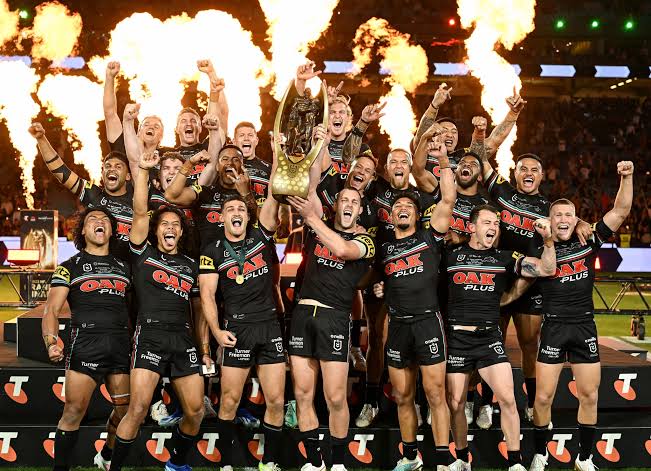
In a surprising turn of events that has sent ripples through the rugby league community, Penrith Panthers co-captain Nathan Cleary expressed his deep disappointment over the team’s decision to withdraw from the upcoming World Club Challenge. Scheduled to take place in the UK, the challenge pits the NRL champions against the best from Super League, offering a prestigious opportunity for teams to showcase their prowess on an international stage. However, the Panthers’ withdrawal has sparked heated discussions among fans, players, and analysts alike.
The Decision to Withdraw
The Panthers’ management cited logistical issues and player welfare concerns as the primary reasons for their decision. With the recent demands of the NRL season, including injuries and the potential for player burnout, the club felt it was in the best interest of their squad to prioritize domestic competitions. While this rationale resonates with many, it has also raised eyebrows among fans who view the World Club Challenge as a significant honor and a chance to elevate the club’s profile internationally.
Cleary’s public statement reflected a sentiment shared by many within the organization. “The World Club Challenge is the only thing that’s missing from our trophy cabinet,” he lamented. His words echoed the frustrations of players who aspire to compete at the highest levels and contribute to the club’s legacy.
Fan Reactions
The reaction from fans has been overwhelmingly mixed. While some understand the need to prioritize player welfare, many supporters are disillusioned. For a club that has enjoyed significant success in recent years, including consecutive premierships, the chance to compete against the best teams in the world represents a pivotal opportunity. Critics argue that the withdrawal undermines the club’s status and diminishes its achievements, suggesting a lack of ambition that could haunt the Panthers in the long run.
Social media platforms exploded with reactions, with hashtags like #BringBackTheChallenge trending as fans expressed their discontent. Some supporters went as far as to accuse the management of prioritizing short-term player safety over long-term prestige and legacy. This divisive sentiment illustrates the deep-rooted passion fans have for their clubs and the expectations they hold.
A Broader Debate
The decision to withdraw from the World Club Challenge also raises broader questions about the growing demands on professional athletes in today’s sports landscape. With an increasingly packed calendar, players face unprecedented levels of physical and mental stress. While prioritizing player welfare is commendable, it also prompts a conversation about the sustainability of current competition formats and the future of international club competitions.
Several former players and pundits have weighed in on the debate, arguing that withdrawing from prestigious events like the World Club Challenge could lead to a lack of competitive edge. Rugby league is about testing yourself against the best, both locally and internationally, noted former player Andrew Johns. If we start prioritizing comfort over competition, we risk diluting the sport’s integrity.
The Future of the World Club Challenge
The future of the World Club Challenge itself hangs in the balance. With more clubs prioritizing domestic competitions and player safety, the challenge risks losing its allure. Organizers must find a way to revitalize interest and ensure that top-tier teams are willing to participate. Potential solutions could include altering the schedule to better accommodate the demands of NRL teams or even introducing financial incentives that could sway reluctant clubs.
Moreover, the NRL needs to reflect on how it can better balance player welfare while maintaining the integrity of international competitions. Without a collaborative effort from all stakeholders, including clubs, players, and governing bodies, the future of events like the World Club Challenge may remain uncertain.
Conclusion
The Penrith Panthers’ withdrawal from the World Club Challenge has ignited a contentious debate about the balance between player welfare and competitive ambition. As the club navigates the complexities of modern rugby league, it remains to be seen how this decision will affect its legacy and standing within the sport. With voices from fans, players, and analysts clamoring for a solution, the challenge now lies in finding a path that honors both the athletes and the rich tradition of rugby league competition.





